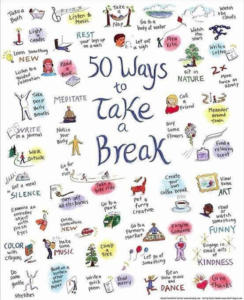Combating Burnout in a Virtual World

As we approach the halfway point of another remote semester, feelings of stress, exhaustion and general lack of interest in your work may become common. If you’re experiencing these feelings, you could be encountering burnout.
The Help Guide defines burnout as “a state of emotional, physical, and mental exhaustion caused by excessive and prolonged stress. It occurs when you feel overwhelmed, emotionally drained, and unable to meet constant demands.”
Associate Teaching Professor and former DELTA Faculty Fellow Angie Smith describes her experience with burnout as feelings of “fatigue, exhaustion, apathy and lack of interest in activities.”
Herbert Freudenberger in 1975 was the first to use the term “burnout” and defined it using three components: “(1) emotional exhaustion – the fatigue that comes from caring too much, for too long; (2) depersonalization – the depletion of empathy, caring, and compassion; and (3) decreased sense of accomplishment – an unconquerable sense of futility: feeling that nothing you do makes any difference” (Nagoski & Nagoski, 2020, p. xi)
We spoke with NC State faculty and DELTA staff members in an effort to open the door for conversations of shared experiences with burnout and how we may utilize some best practices in working toward combating its effects.
Listen to Your Needs
When sensing the effects of burnout in your work life, being self-aware is helpful in working toward understanding what you may need.
Smith suggests “practicing the self-care you need in various forms (physical, emotional, cognitive, etc.) that makes the most sense for you in the moment.” Smith also explains, “it is important to check-in with yourself each day and set healthy boundaries. A phrase that I continue to share with myself and others is ‘progress not perfection’. Additionally, if you are feeling burnout, take small steps toward incremental changes, share your needs with trusted friends, family members, etc. and don’t be afraid to seek professional support from a trained counselor. As we are experiencing the enmeshment of integrating multiple roles simultaneously, it is essential to reflect on our own capacity and not try to do it all.”
Figuring out what is essential for our well-being is far more important than pushing the next deadline or assignment, and Smith urges for moments of self-awareness in the midst of stress and apathy.
Take Breaks
A break from work is more than having lunch with your laptop open nearby. Listen to what you need, and take breaks or time off reflecting those needs.
“I try to avoid working for long periods of time. It’s too easy to just always be ‘kinda working’ and never take some time really off. Don’t ‘just check in’ here and there,” suggests David Howard, director of DELTA’s Instructional Innovation Services.
 As work and home life become increasingly difficult to separate in a virtual environment, setting boundaries of separation between the two is important in allowing ourselves space away from the stressors of professional life. Disconnecting from the computer, spending time outside, stretching and being with family and friends are all effective ways to step away from the road to burnout.
As work and home life become increasingly difficult to separate in a virtual environment, setting boundaries of separation between the two is important in allowing ourselves space away from the stressors of professional life. Disconnecting from the computer, spending time outside, stretching and being with family and friends are all effective ways to step away from the road to burnout.
Go Easy on Yourself
The truth is, we can’t do it all. Giving ourselves space to relieve pressure is a way in which we can avoid running into burnout. Setting realistic goals with reasonable time constraints is much more productive than piling on an enormous workload to complete from your home office. Remind yourself you are doing your best at the moment by lowering your expectations to the capacity of which you can accomplish as much as you can.
DELTA’s Associate Director of Instructional Technology Training Bethany Smith recommends “recognizing that burnout exists and is not an indication of failure. Planning can be a great coping mechanism, but set reasonable goals and expectations.”
As we recognize the reality of burnout, we are given the opportunity to modify what our remote schedules look like.
Associate Director of Project Management at DELTA Merranie Zellweger advises students, faculty and staff to keep in mind that “it’s okay not to do everything. Prioritize ruthlessly, communicate proactively and let other things go for a time. One day at a time, you can always adjust and pivot as needed.”
Resources
NC State DELTA is here to help provide aid amongst the stressors of remote learning and working. Here are some resources to help combat feelings of burnout.
- DELTA Faculty Fellows Share Ways to Plan Breaks for Students this Spring
- Moments of Refreshment
- Faculty Chat Cafe: Teaching in Uncertain Times, recurring on Fridays, 9-10 a.m.
- Wellness Days
- Counseling Center
- Faculty and Staff Ombuds Office
- Freudenberger, Herbert J. “The Staff Burnout-Out Syndrome in Alternative Institutions.” Psychotherapy Research and Practice 12 (January 1975): 73-82.
- “Burnout: the Secret of Unlocking the Stress Cycle” by Emily Nagoski and Amelia Nagoski.
- Categories:


